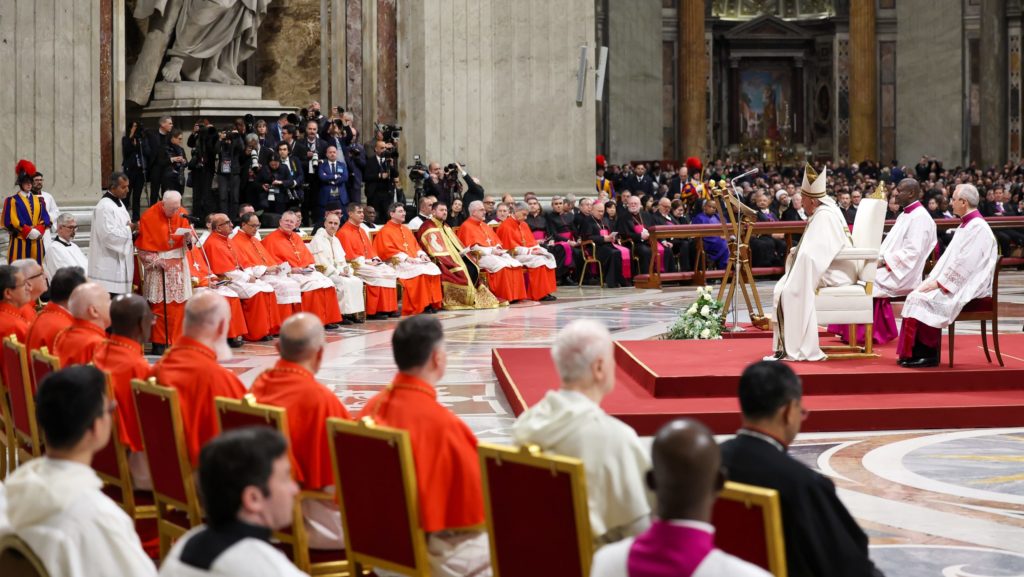Becoming a cardinal is an insistent call to put Jesus at the center of one's life, to love the poor as he did and to strengthen the bonds of unity within the Catholic Church, Pope Francis said as he created 21 new cardinals from 17 nations.
"To walk in the path of Jesus means, in the end, to be builders of communion and unity," the pope told the new cardinals during an afternoon consistory Dec. 7 in St. Peter's Basilica.
Cardinal Angelo Acerbi, a 99-year-old former Vatican diplomat, was the first to receive his red hat from Pope Francis. And Cardinal Domenico Battaglia of Naples, whom Pope Francis added to the list of new cardinals in November -- a month after announcing the others -- was the last.
Cardinal Francis Leo of Toronto was the only North American among the new cardinals.
Pope Francis presided over the prayer service with a large bruise on the lower part of his right cheek and chin. He had fallen early Dec. 6, and photos from his audiences that morning showed him wearing a small bandage on his chin.
Matteo Bruni, director of the Vatican press office, said the pope had hit his chin on his bedside table.
The creation of cardinals took place within a prayer service, which included reading the Gospel of St. Mark's account of the Apostles James and John asking Jesus to "grant that in your glory we may sit one at your right and the other at your left."
The disciples' concern about earthly glory also can infect followers of Jesus today, the pope said. "Our hearts can go astray, allowing us to be dazzled by the allure of prestige, the seduction of power, by an overly human zeal for the Lord. That is why we need to look within, to stand before God in humility and before ourselves in sincerity, and ask: Where is my heart going? Where is it directed?"
"Among the disciples, the worm of competition was destroying unity, while the path that Jesus walked was leading him to Calvary" and the ultimate sacrifice, Pope Francis told the new cardinals and thousands of people -- including current members of the College of Cardinals -- who gathered to celebrate with them.
On the cross Jesus fulfilled his saving mission, the pope said, and he tore down "the dividing wall of hostility" so that "all might see themselves as children of the same Father and as brothers and sisters of one another."
"For this reason, the Lord is looking to you, who come from different backgrounds and cultures, and represent the catholicity of the church," the pope told them. "He is calling you to be witnesses of fraternity, artisans of communion and builders of unity."
In one reflection of the church's diversity and universality, four of the new cardinals were not wearing a red cassock with a white surplice, topped by a red cape. Instead, the two cardinals from Eastern Catholic churches -- Cardinals Mykola Bychok, a Ukrainian Greek Catholic, and George Jacob Koovakad, a Syro-Malabar Catholic -- wore vestments from their church traditions. And the two Dominicans -- Cardinals Timothy Radcliffe, a theologian, and Jean-Paul Vesco, archbishop of Algiers -- wore their white habits.
Pope Francis gave each of the new cardinals from the Latin-rite church a red zucchetto, a red biretta and a ring. Cardinals Bychok and Koovakad received special headdresses.
And echoing the practice centuries ago when the clergy of Rome elected the pope, the bishop of Rome, each of the new cardinals was assigned a title or "titular" church in the city, making them members of the diocese's clergy.
Pope Francis asked the cardinals to wear the cardinals' red as a reminder of their call to "be fearless witnesses to Christ and his Gospel in the city of Rome and in faraway regions.
During the consistory, the new cardinals made a profession of faith by reciting the Creed in Latin and made an oath of fidelity to Pope Francis and his "canonically elected" successors.
With the consistory, the College of Cardinals reached 253 members, 140 of whom were under the age of 80 and eligible to enter a conclave to elect a new pope.
Speaking on behalf of the group, Cardinal Acerbi thanked Pope Francis and emphasized how the new cardinals were committed to strengthening the unity of the church and promoting peace at a time when, "unfortunately, the human family is disturbed and disfigured by inequalities, wars and poverty in many parts of the world."
In his homily, the pope told the new cardinals that the Lord was calling them to be "a radiant sign in the midst of a society obsessed with appearances and power" by not arguing over who is the greatest or who is right most often.
"Love one another with fraternal love and be servants to one another, servants of the Gospel," Pope Francis told them.

